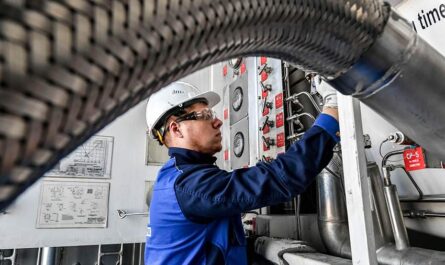What is Propane?
Propane is a three-carbon alkane with the molecular formula C3H8. It is a liquefied petroleum gas (LPG) that is derived from natural gas processing or crude oil refining. Propane is colorless and odorless in its pure form, however an odorant is added before distribution to help detect any leaks. With a boiling point of −43 °C, propane is stored and transported as a liquid under moderate pressure.
Uses of Propane
Residential Use
Approximately 30% of propane is used for residential purposes such as home heating, water heating, cooking and outdoor grilling. Propane furnaces are a common choice for home heating in rural areas not served by natural gas pipelines. Propane tankless water heaters and stovetops are also popular residential appliances. The convenience of portable propane cylinders makes it a go-to fuel for outdoor grilling and camping.
Commercial Use
Around 27% of propane is consumed commercially in various applications such as food service equipment, laundry/dry cleaning, space/process heating and power generation. Propane refrigerators are commonly used in supermarkets and food trucks. Propane heating systems provide efficient space and process heating for warehouses, greenhouses and industrial facilities. It also acts as backup power generation fuel during outages.
Agricultural Use
Agriculture accounts for about 14% of total propane demand. Farm equipment like grain dryers, feed mills and tractors run on propane. Dairy farms use it to power manure management equipment. Poultry and livestock farms use propane brooders, heaters and incubators. Post-harvest applications include curing tobacco, drying corn and propane orchard heaters.
Transportation Sector
Approximately 8% of propane is used as a transportation fuel, especially for fleets. It powers school buses, delivery trucks, local city buses and taxis. As an alternative fuel, propane emits fewer greenhouse gases than gasoline or diesel. Bi-fuel and dedicated propane vehicles offer fleets significant cost savings on fuel expenditures.
Industrial Use
Remaining industrial demand for Propane includes uses such as petrochemical feedstock production of plastics and resins, as fuel in oil refineries and other process applications in the chemical, metals, concrete and pulp/paper industries.
Benefits of Using Propane
Safety
Propane is odorized with a chemical called ethanethiol to give it a strong rotten egg smell, allowing even minute leaks to be easily detected. Unlike gasoline, propane sinks instead of floating on water in the event of a spill, preventing fire hazards. It is also non-corrosive and non-toxic. Modern appliances have automatic shut-off valves for additional safety.
Efficiency
Propane burning appliances have high energy efficiency and precise temperature control. Condensed heat units provide up to 91-95% fuel-to-steam efficiency for process heating and space heating equipment. This makes propane a cost-effective choice compared to electricity.
Clean Burning
When combusted, propane produces carbon dioxide and water vapor with very low emissions of nitrogen oxide, carbon monoxide and particulate matter—less than half of oil and one-third of coal. It is designated as an ultra-low emissions fuel by the EPA, making it environmentally responsible.
Reliability
With distribution primarily through pipelines instead of roads, propane supplies are reliable even in emergencies. Backup storage tanks provide an uninterrupted fuel supply during power outages lasting several days. The liquid form also allows for easy transportation and on-site storage.
Cost Savings
While upfront installation costs of propane appliances may be higher, much lower fuel costs compared to electricity or other alternatives results in significant long-term savings for customers. Tax credits and incentives are also available for converting to propane equipment.
Outlook for Propane
According to industry reports, global propane consumption is predicted to grow 1.7% annually until 2030 due to increasing commercial and industrial activity in developing nations. In the United States, propane demand has increased 7% over the past five years, driven by record exports and petrochemical sector expansion. Domestic production is also on the rise with shale gas development.
The transportation sector presents a major growth opportunity, especially for fleets, given the push toward alternative fuels and incentives for propane vehicles. Agricultural applications are expanding with rising global food demand. Increased adoption of combined heat and power systems utilizing propane’s potential as a power generator will further support future demand.
In conclusion, propane remains an indispensable fuel and feedstock in diversified applications worldwide. Its favorable properties make it preferable for rural heating, agricultural/industrial processes and fleet transportation. With a growing focus on sustainability and energy security, propane’s role as a clean and domestic energy source ensures its popularity will keep rising. Strategic infrastructure investments and technology advancements will help meet the demand from sectors transitioning to propane in the coming decades.
Note:
1. Source: Coherent Market Insights, Public sources, Desk research
2. We have leveraged AI tools to mine information and compile it



